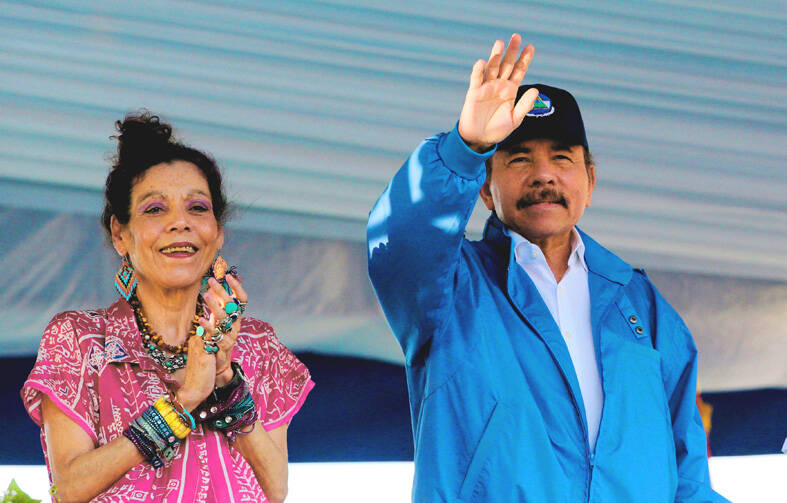The Nicaraguan parliament, dominated by the ruling Sandinista Front, on Friday approved a constitutional reform that hands more power to Nicaraguan President Daniel Ortega and his wife, Vice President Rosario Murillo, as well as the Central American nation’s police and military.
The reform increases the president’s control over the media, extends the presidential term to six years from five, and changes the roles of vice president and president to those of “co-presidents.”
Murillo would now become his co-president. The two have been married since 2005 and she was made vice president in 2017.

Photo: REUTERS
Ortega has cracked down on dissent over recent years. More than 200 political prisoners were freed early last year and expelled to the US, including five former presidential hopefuls who had been jailed after seeking to challenge the increasingly authoritarian Ortega in a 2021 election.
Under the new reform, the co-presidents would have control over the legislature, judiciary and electoral, public administration, and oversight bodies as well as autonomous entities.
It also mandates that the state would ensure media are not “subject to foreign interests and do not spread false news.”
The reform must pass a second legislative vote next year before becoming law.
Government critics have said the reforms legalize the “absolute power” already exercised for years by Ortega and Murillo.
The Organization of American States, a regional diplomatic body, has said that through the reform Ortega and Murillo intend to “increase their absolute control of the state and maintain their position in power.”
The reform, which 79-year-old Ortega sent to the Nicaraguan Congress on Tuesday “as a matter of urgency,” was approved unanimously by 91 lawmakers.
National Assembly of Nicaragua President Gustavo Porras, confirmed during Friday’s session that the reform would be voted on and approved for a second time on Jan. 10, following Nicaraguan law that says constitutional changes must be approved in two legislative periods.
Porras brushed off criticisms of the reform, calling them “a stupid way of carrying out opposition.”
Dora Maria Tellez, a former Sandinista guerrilla expelled to the US after being jailed in 2021, said that besides giving “constitutional status to everything that the dictatorship has been doing de facto,” the reform was paving the way for Ortega’s succession.
“The co-presidency gives Rosario Murillo total power in Nicaragua, which she will end up assuming when Daniel Ortega is gone,” Tellez said, adding that the co-presidents’ ability to appoint vice presidents “clears the way for the children of the ruling couple to be constitutionally placed in the line of succession.”
UN High Commissioner for Human Rights Volker Turk in a statement said the changes marked a concerning further erosion of checks and balances on executive power.
“If adopted, these changes will sound the death knell for fundamental freedoms and rule of law in Nicaragua,” he said.

Australia has announced an agreement with the tiny Pacific nation Nauru enabling it to send hundreds of immigrants to the barren island. The deal affects more than 220 immigrants in Australia, including some convicted of serious crimes. Australian Minister of Home Affairs Tony Burke signed the memorandum of understanding on a visit to Nauru, the government said in a statement on Friday. “It contains undertakings for the proper treatment and long-term residence of people who have no legal right to stay in Australia, to be received in Nauru,” it said. “Australia will provide funding to underpin this arrangement and support Nauru’s long-term economic

‘NEO-NAZIS’: A minister described the rally as ‘spreading hate’ and ‘dividing our communities,’ adding that it had been organized and promoted by far-right groups Thousands of Australians joined anti-immigration rallies across the country yesterday that the center-left government condemned, saying they sought to spread hate and were linked to neo-Nazis. “March for Australia” rallies against immigration were held in Sydney, and other state capitals and regional centers, according to the group’s Web site. “Mass migration has torn at the bonds that held our communities together,” the Web site said. The group posted on X on Saturday that the rallies aimed to do “what the mainstream politicians never have the courage to do: demand an end to mass immigration.” The group also said it was concerned about culture,

ANGER: Unrest worsened after a taxi driver was killed by a police vehicle on Thursday, as protesters set alight government buildings across the nation Protests worsened overnight across major cities of Indonesia, far beyond the capital, Jakarta, as demonstrators defied Indonesian President Prabowo Subianto’s call for calm. The most serious unrest was seen in the eastern city of Makassar, while protests also unfolded in Bandung, Surabaya, Solo and Yogyakarta. By yesterday morning, crowds had dispersed in Jakarta. Troops patrolled the streets with tactical vehicles and helped civilians clear trash, although smoke was still rising in various protest sites. Three people died and five were injured in Makassar when protesters set fire to the regional parliament building during a plenary session on Friday evening, according to

STILL AFLOAT: Satellite images show that a Chinese ship damaged in a collision earlier this month was under repair on Hainan, but Beijing has not commented on the incident Australia, Canada and the Philippines on Wednesday deployed three warships and aircraft for drills against simulated aerial threats off a disputed South China Sea shoal where Chinese forces have used risky maneuvers to try to drive away Manila’s aircraft and ships. The Philippine military said the naval drills east of Scarborough Shoal (Huangyan Island, 黃岩島) were concluded safely, and it did not mention any encounter with China’s coast guard, navy or suspected militia ships, which have been closely guarding the uninhabited fishing atoll off northwestern Philippines for years. Chinese officials did not immediately issue any comment on the naval drills, but they